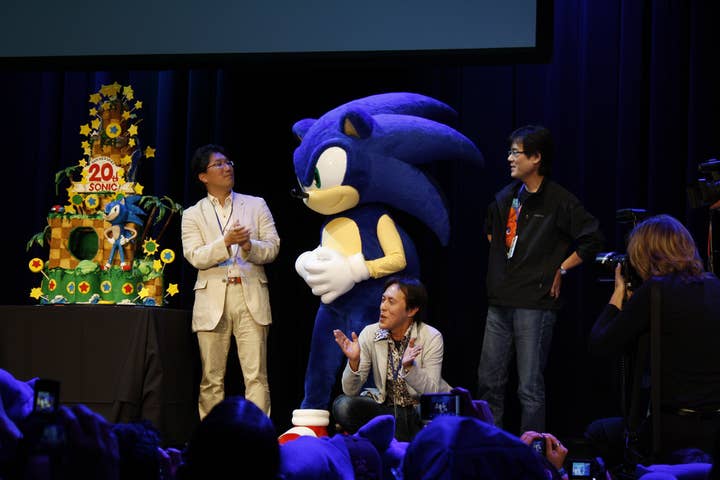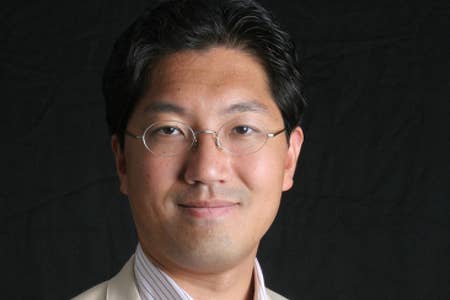Game Industry Legends: Yuji Naka
Sonic creator on his legacy, why current Sonic games are "not as fun," and his desire to make big AAA games again
Yuji Naka may not have the same name recognition these days as Shigeru Miyamoto or Hideo Kojima, but he's absolutely one of the pillars of Japanese video game development. If it weren't for Naka-san's efforts in creating Sonic the Hedgehog and leading Sonic Team, our generation would never have witnessed the glorious Nintendo vs. Sega rivalry, which ultimately produced many brilliant games on both sides.
In March of 2006, Naka-san eventually decided to test the development waters with his own studio, Prope. He was actually the last member of the core creative team that created Sonic to leave Sega, which may explain the decline of the franchise (but we'll get to that later).
In this exclusive, GamesIndustry International had a rare opportunity to speak with the legend about a variety of topics.
We started by asking him about his legacy, which he actually found to be a somewhat strange query.
"Being asked about 'Yuji Naka's legacy' is a little odd since I'm still actively creating games. When I finally retire from making games, I assume people will decide what my lasting 'legacy' will be at that point… though I think it will probably be Sonic," he said.
He then reflected on some of the critically acclaimed games he designed: "It's been 28 years since I started developing games, and during that span I've brought a lot of products into this world. Out of those titles Sonic is the one that is the most remembered, but Phantasy Star Online, an online game put out on a family-oriented game console, had a lot of hardships during development but I think we were able to release a really good and advanced product at the time. Perhaps just barely being able to release it within the end of the 20th century has something to do with why I feel so strongly about that game."
"I think even moderately raising the difficulty level [of Sonic games] in the future could work well"
Yuji Naka
"The arcade game Samba de Amigo also stands out because the player uses their entire body to move and have fun. Using the newest cutting-edge technology to create a simple and just plain stupid innocent fun game was rewarding."
Given that the last several years of Sonic gaming have been mostly sub-par (by Sega's own admission), we couldn't resist the opportunity to pick Naka-san's brain about what's gone wrong with the cherished franchise he started. Ironically, the explosion of the games industry in the last couple decades could have something to do with it, as more and more companies are trying to appeal to the mainstream - and that may not have been the best approach for Sonic.

"I also think that recent iterations have not been as fun when compared to those of the past," Naka-san agreed, proceeding to explain what Sega has done wrong: "I think the number one reason for this is that the games have become much easier, so the gamer doesn't feel that extreme joy that comes with the satisfaction of accomplishing something that was very difficult to achieve."
He continued, "Today's games are created to appeal to as wide of an audience as possible, so that's why the difficulty levels are so low in order to have both experienced and non-experienced gamers be able to play them. Sonic has a very simple control scheme that is capable of doing a lot of advanced things while sprinting at a high speed, that's what makes it a good game in my opinion. I think even moderately raising the difficulty level in the future could work well."
It's been years since we've seen a rivalry as fierce as Nintendo vs. Sega in the 16-bit days. It's an era that brings a huge grin to the faces of most people in this editor's generation. Naka-san admitted to us that he'd sort of like to see Mario and Sonic continue to be adversaries: "Thinking back to the rivalry between Sonic and Mario back in those days brings back some fond memories. It was based on each of them running on different hardware and which one was better, which made for a great rivalry. I would like for Sonic and Mario to keep up that rivalry relationship long into the foreseeable future."
Of course, we all know that's not happening now that Sega's no longer a hardware manufacturer and Sonic's already appeared with Mario in a few games. Naka-san did express his wish to possibly one day breathe new life into Sonic again, or into one of his other fan favorites like Nights. "Unfortunately, I haven't had the opportunity to do so but perhaps at some point in the future if I could come back and contribute, that could be fun and gratifying," he remarked. Are you listening, Sega?
So what's Naka-san's focus in 2012? Not surprisingly, like many veterans of this business he's moved to social and mobile experiences. He sees "the recent surge in smartphones [as] having a huge impact on console games. It's something that should be monitored carefully moving [into the] future."
That said, there's still very much a place in his heart for huge triple-A games.
"Actually, when Prope was originally formed we were working on large titles, hoping to create something that's never been seen in the industry before. Unfortunately, those 2 titles were cancelled in mid-development and never made public," he revealed.
"Wii U is taking a completely new and innovative approach, so I'm really looking forward to seeing what Nintendo has in store there"
Yuji Naka
"With this history, we would like to work on a large-scale project again at some point, but working on the smaller projects is very fun and rewarding too as we always strive to put out new and unique games regardless of scale. Speaking of which, Prope's next project is actually a social networking RPG for smartphones called Buddy Monster."
Perhaps the fast-approaching next-gen hardware will enable Prope and Naka-san to finally tackle a big console project again. Naka-san seemed particularly excited by the Wii U launch coming later this year.
"I always get very excited when thinking about the next round of next-gen hardware that's coming and what kind of unimaginable specs they could have. Wii U is taking a completely new and innovative approach, so I'm really looking forward to seeing what Nintendo has in store there," he said.
As the conversation moved on, we approached Naka-san about the state of Japanese games development. It seems to be fashionable these days to bash the Japanese design approach, and some of Naka-san's contemporaries (most notably, Keiji Inafune) have said that Japan's game industry must change its ways, but Naka-san stood up for the Japanese style in gaming.
"I think there's still a lot to be said for the unique characteristics and benefits that games that are developed in Japan have. I would like to see Japan-developed games continue to be exported and enjoyed by everyone in the world," he commented.
In closing, Naka-san said that he's been encouraged with the influx of talent we've seen in the industry in recent years, as evidenced by the indie scene. He offered the following advice to aspiring game designers: "To be open minded, and to try many different things so that they'll have many skill sets to incorporate any original ideas they may have - this would be a positive experience and help them evolve and grow. I look forward to the day when this new crop of game designers can put out some truly mind-blowing stuff."
Indeed, perhaps the "next Yuji Naka" is already making the next great game to define a generation.

